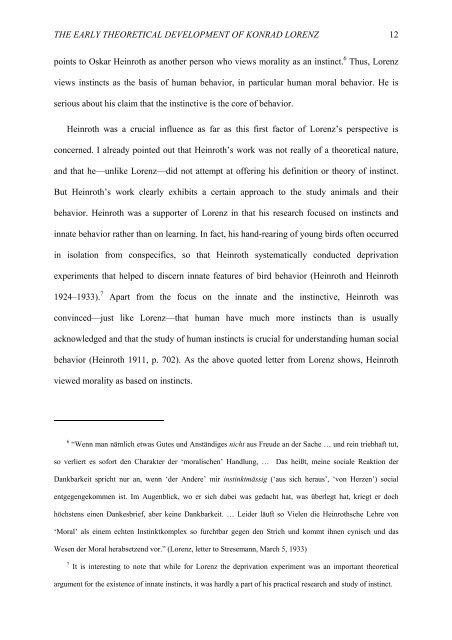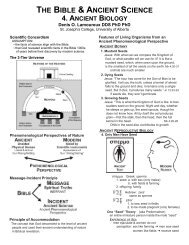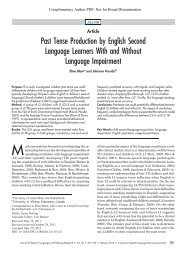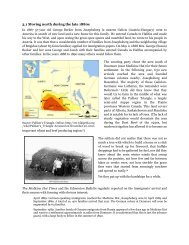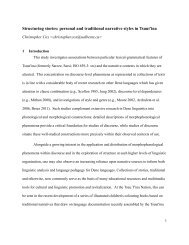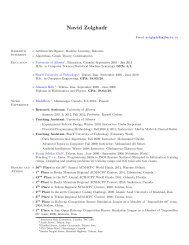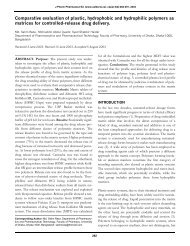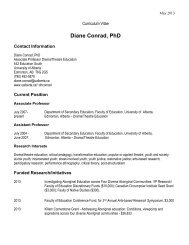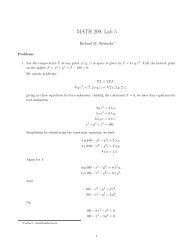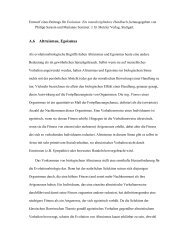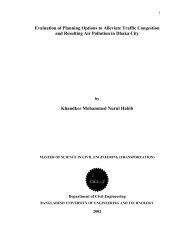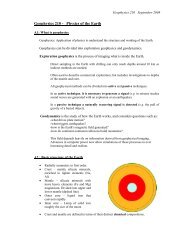The early theoretical development of Konrad Lorenz - University of ...
The early theoretical development of Konrad Lorenz - University of ...
The early theoretical development of Konrad Lorenz - University of ...
You also want an ePaper? Increase the reach of your titles
YUMPU automatically turns print PDFs into web optimized ePapers that Google loves.
THE EARLY THEORETICAL DEVELOPMENT OF KONRAD LORENZ 12<br />
points to Oskar Heinroth as another person who views morality as an instinct. 6 Thus, <strong>Lorenz</strong><br />
views instincts as the basis <strong>of</strong> human behavior, in particular human moral behavior. He is<br />
serious about his claim that the instinctive is the core <strong>of</strong> behavior.<br />
Heinroth was a crucial influence as far as this first factor <strong>of</strong> <strong>Lorenz</strong>’s perspective is<br />
concerned. I already pointed out that Heinroth’s work was not really <strong>of</strong> a <strong>theoretical</strong> nature,<br />
and that he—unlike <strong>Lorenz</strong>—did not attempt at <strong>of</strong>fering his definition or theory <strong>of</strong> instinct.<br />
But Heinroth’s work cl<strong>early</strong> exhibits a certain approach to the study animals and their<br />
behavior. Heinroth was a supporter <strong>of</strong> <strong>Lorenz</strong> in that his research focused on instincts and<br />
innate behavior rather than on learning. In fact, his hand-rearing <strong>of</strong> young birds <strong>of</strong>ten occurred<br />
in isolation from conspecifics, so that Heinroth systematically conducted deprivation<br />
experiments that helped to discern innate features <strong>of</strong> bird behavior (Heinroth and Heinroth<br />
1924–1933). 7 Apart from the focus on the innate and the instinctive, Heinroth was<br />
convinced—just like <strong>Lorenz</strong>—that human have much more instincts than is usually<br />
acknowledged and that the study <strong>of</strong> human instincts is crucial for understanding human social<br />
behavior (Heinroth 1911, p. 702). As the above quoted letter from <strong>Lorenz</strong> shows, Heinroth<br />
viewed morality as based on instincts.<br />
6 “Wenn man nämlich etwas Gutes und Anständiges nicht aus Freude an der Sache … und rein triebhaft tut,<br />
so verliert es s<strong>of</strong>ort den Charakter der ‘moralischen’ Handlung, … Das heißt, meine sociale Reaktion der<br />
Dankbarkeit spricht nur an, wenn ‘der Andere’ mir instinktmässig (‘aus sich heraus’, ‘von Herzen’) social<br />
entgegengekommen ist. Im Augenblick, wo er sich dabei was gedacht hat, was überlegt hat, kriegt er doch<br />
höchstens einen Dankesbrief, aber keine Dankbarkeit. … Leider läuft so Vielen die Heinrothsche Lehre von<br />
‘Moral’ als einem echten Instinktkomplex so furchtbar gegen den Strich und kommt ihnen cynisch und das<br />
Wesen der Moral herabsetzend vor.” (<strong>Lorenz</strong>, letter to Stresemann, March 5, 1933)<br />
7 It is interesting to note that while for <strong>Lorenz</strong> the deprivation experiment was an important <strong>theoretical</strong><br />
argument for the existence <strong>of</strong> innate instincts, it was hardly a part <strong>of</strong> his practical research and study <strong>of</strong> instinct.


